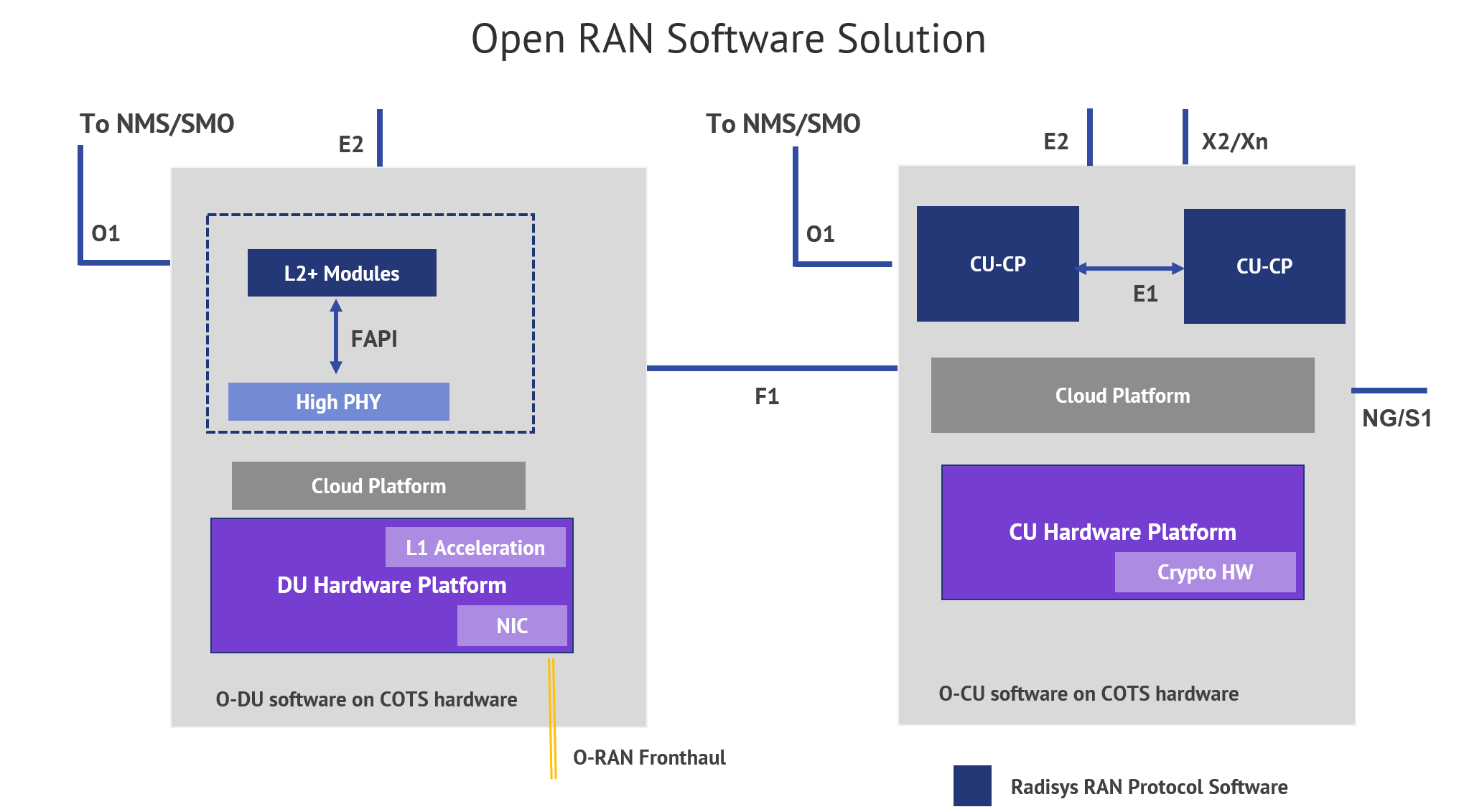Formed by operators, the O-RAN Alliance defines requirements that enable the benefits of open RAN. The O-RAN design complements 3GPP, ONAP and ETSI specifications. The O-RAN Alliance has defined new interfaces which are not part of 3GPP to create easier interoperability and enabling centralized management and control on top of existing 3GPP RAN interfaces.
Open RAN Overview
Accelerate Network Transformation through Disaggregation
Open RAN refers to a Radio Access Network (RAN) which is open, intelligent, and deployed on a virtualized platform with high flexibility. Open RAN is about disaggregating hardware from software: open hardware and software using standard processors with open interfaces.
O-RAN is based on standards developed by the O-RAN Alliance, a global alliance founded in 2018 by operators to define requirements and to realize the benefits of open RAN. O-RAN is built on four functional blocks:
-
Virtualized distributed unit (vDU) with O-RAN supporting remote radio units (RRUs)
-
Multi-connections, radio access technology (RAT) agnostic virtualized centralized unit (vCU)
-
RAN intelligent controller (RIC)
-
Centralized management and orchestration
The ABCs of Open RAN
These key terms are a great way to better understand Open RAN endeavors and deployments.
Read Article
Key Benefits
An Alternative to Legacy RAN Architectures
Evolution Toward Open RAN
The traditional RAN architecture was based on the Distributed Radio Access Network (D-RAN) model in which Baseband Units (BBUs) and Remote Radio Heads (RRHs) are proprietary and co-located at the cell site. Centralized RAN (C-RAN) brought the idea of a “centralization BBU pool” but the CPRI based fronthaul did not scale to support the capacity and performance requirements of 5G. Both D-RAN and C-RAN architectures incur high operating expenses (Opex), underutilize RAN resources and limit deployment flexibility for 5G.
Cloud RAN builds on centralized RAN by running virtualized baseband functions on commodity server hardware (COTS) based on the Network Functions Virtualization (NFV). By building on the pillars of openness and embedded intelligence, Cloud RAN has evolved into Open RAN.
This disaggregation, or openness, enables multivendor deployments and new intelligent functions, such as machine learning and artificial intelligence. Operators can use these new intelligent functions to automate operational network functions and reduce operational costs.
Open RAN - Enabling the O-RAN of the Future Today
Mobile operators are transforming their networks to keep up with the demands of next-generation connectivity and user experience.
Read More
Key Benefits
Why Radisys Connect Open RAN for you?
Our industry leading 5G NR protocol software for Open RAN is compliant with O-RAN architecture, supporting open interfaces and optimized for performance. The software is based on 3GPP Release 15 with upcoming support for Release 16 and Release 17.
With wide-ranging ecosystem partnerships, we offer Open RAN software on multiple SoC’s and target hardware platforms. Radisys protocol software is agnostic to underlying hardware but optimized to provide best-in-class integration for performance on target platforms. With our decades long expertise in wireless domain, our protocol layers fare hardened for various indoor and outdoor deployment scenarios to deliver best RAN performance.
Radisys Open RAN compliant software provides near theoretical peak throughput performance using an optimal number of CPU cores. The software can be deployed flexibly on bare metal COTS servers or as containerized network functions on cloud infrastructure. Our software is unique in its ability to provide full functionality and performance with highly optimized, low end processor systems to data center grade powerful high-performance servers. You can flexibly deploy our software on appropriate target hardware based on the use cases and deployment scenarios.
Standardized management interfaces for FCAPS and data models per 3GPP and O-RAN are supported for easy integration with element management and network management systems.
Radisys Open RAN software is tested for interoperability with partner and 3rd party network elements. Our RAN software has been interoperability tested with multiple PHY/radio partners, core network implementations, commercial handsets and UE test equipment. We continue to showcase our solution interoperability in various industry events like O-RAN Plugfest and through OTIC lab activities.
With full support for disaggregation in true Open RAN spirit, Radisys O-RAN Protocol software solution provides complete control/user plane separation, integration through open interfaces with RAN Intelligent controllers (RICs) and application of AI/ML through various xApps per O-RAN architecture.
We offer a high-performance and feature-rich complete software package that is fully interoperable for multi-vendor Open RAN deployments in public and private network deployments.

Key Benefits
The Right Network Topology for Open RAN
O-RAN is operator-driven and enables CSPs, MVNOs, private or enterprise wireless service providers to have flexibility in their network deployments, leveraging best-of-breed network elements. Radisys Connect Open RAN can be deployed in unlicensed spectrum like CBRS or in a co-existence scenario of licensed spectrum with unlicensed bands in multi-mode operation in a HetNet like environment. System integrators like Radisys have significant experience from IT cloud and telco cloud multi-vendor integrations and can help optimize cost and reduce time to market.
Exploring Functional Splits in 5G RAN: Tradeoffs and Use Cases
Read Article
Key Benefits

Open RAN Ecosystem
O-RAN Alliance
Open RAN Policy Coalition
The Open RAN Policy Coalition promotes government policies that support the development and adoption of open and interoperable solutions to create innovation for advanced wireless technologies like 5G.
Telecom Infra Project (TIP)
TIP is a community of companies and organizations dedicated to driving open, disaggregated and standards-based technology solutions, such as Open RAN.
DARPA’s Open, Programmable, Secure 5G (OPS-5G)
The United States Defense Advanced Research Projects Agency (DARPA) introduced a program to solicit innovative research proposals called “Open Programmable Secure 5G” to create open-source software and systems enabling secure 5G.